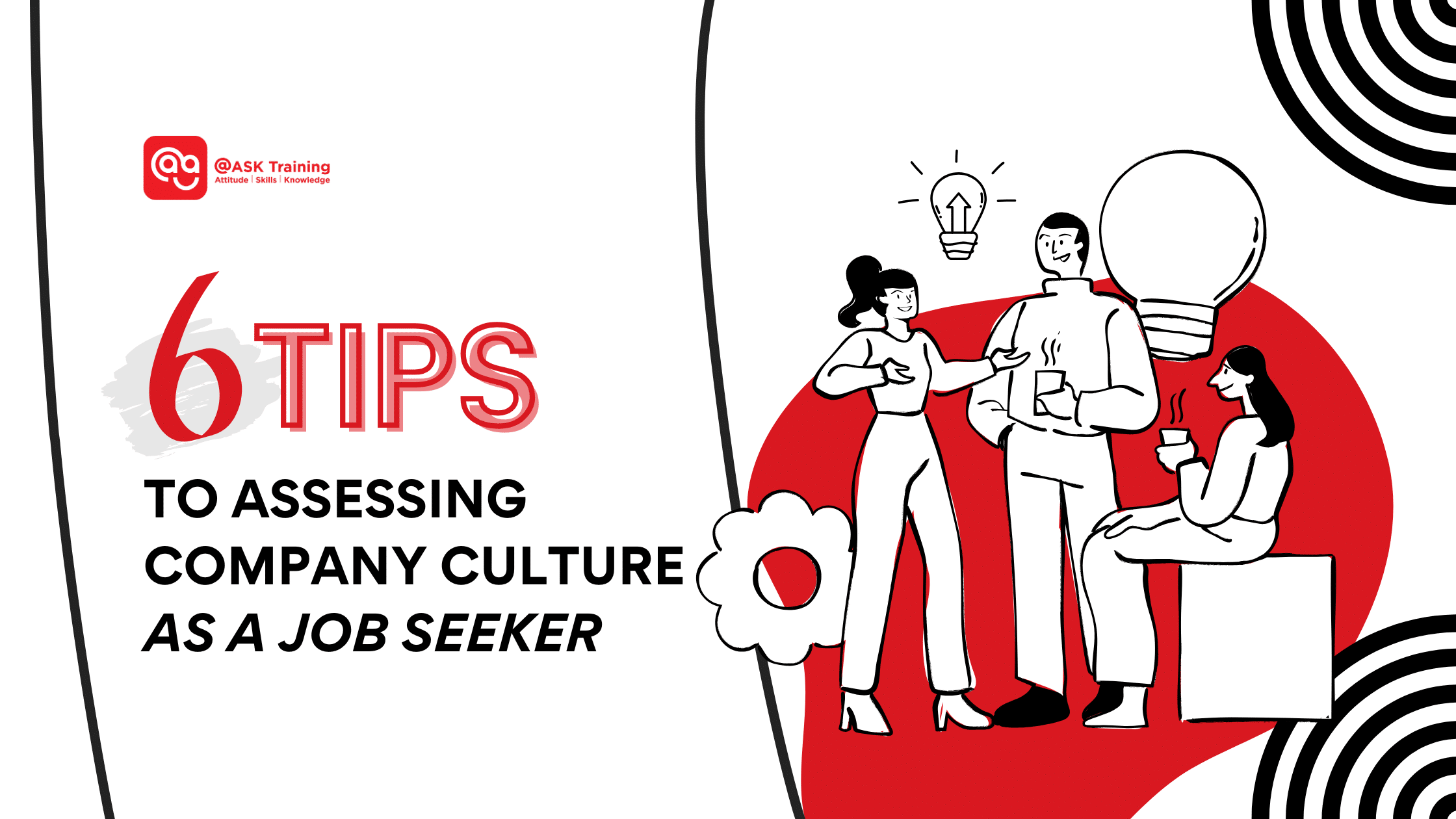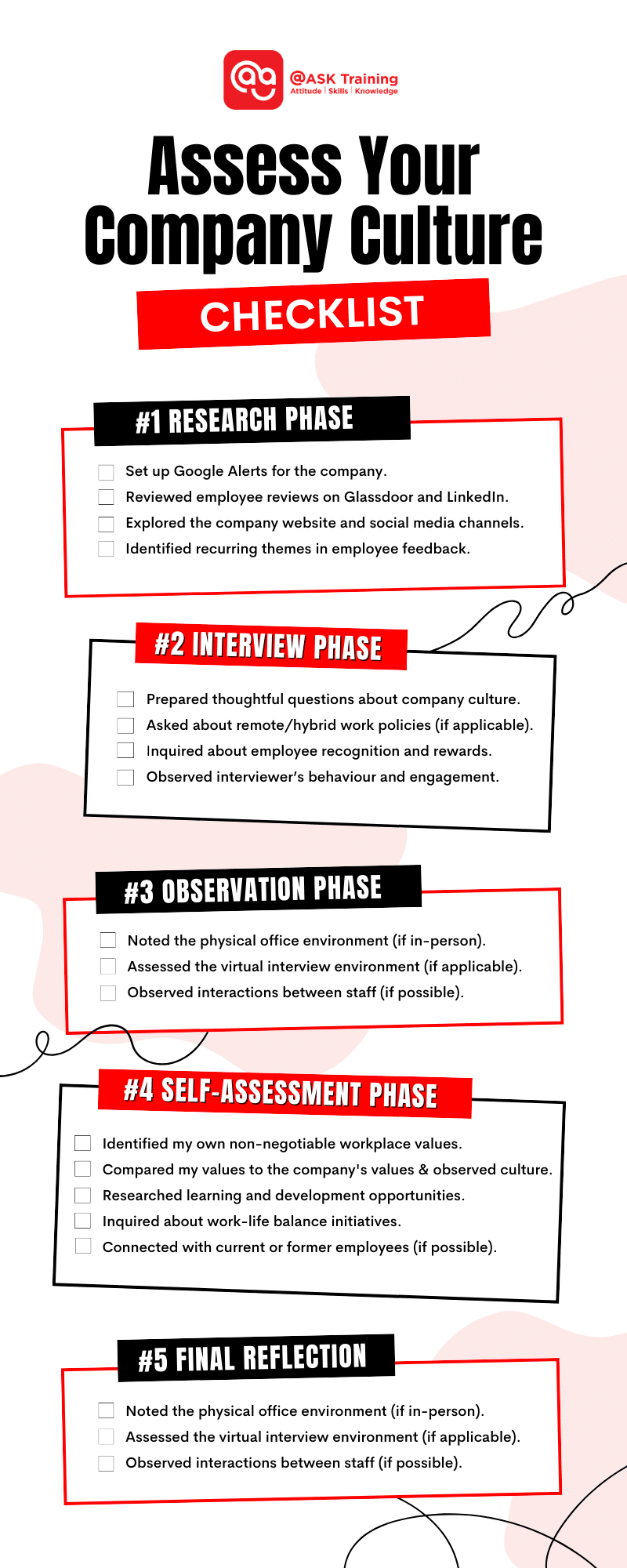 Landing a new job is exciting, but it’s more than just a paycheck. It’s about finding a place where you can thrive, contribute, and feel valued. That’s where company culture comes in.
For job seekers actively applying for roles and even for career advisors guiding others or professionals contemplating a change, understanding a company’s culture is absolutely essential.
This is reflected in the fact that a large majority (88%) of job seekers value company culture, with nearly half (46%) going so far as to say it’s a deciding factor in their application process.
This article gives you the tools to become a culture detective, ensuring your next move is a step in the right direction. So, where do you begin your investigation of assessing company culture?
Landing a new job is exciting, but it’s more than just a paycheck. It’s about finding a place where you can thrive, contribute, and feel valued. That’s where company culture comes in.
For job seekers actively applying for roles and even for career advisors guiding others or professionals contemplating a change, understanding a company’s culture is absolutely essential.
This is reflected in the fact that a large majority (88%) of job seekers value company culture, with nearly half (46%) going so far as to say it’s a deciding factor in their application process.
This article gives you the tools to become a culture detective, ensuring your next move is a step in the right direction. So, where do you begin your investigation of assessing company culture?
Tip #1 Research the Company
Think of this as your pre-interview inspection. You wouldn’t go into a meeting unprepared, and the same goes for assessing a company’s vibe:- Google Alerts: Set up alerts for the company name. This keeps you in the loop on recent news, awards, or even potential red flags. It’s like having a personal news clipping service.
- Glassdoor & LinkedIn: These are goldmines of employee reviews and insights. Look for patterns such as, are people consistently praising the work-life balance or complaining about micromanagement. Employee reviews on platforms like Glassdoor can reveal trends in job satisfaction, leadership style, and workplace dynamics.
- Company Website & Social Media: Go beyond the polished marketing materials. Look at their blog, social media posts, and even their “About Us” page. What language do they use? What values do they emphasise? This gives you a glimpse into their true priorities.
Tip #2 Evaluate During Interviews
The interview isn’t just about them grilling you; it’s your chance to assess them too. Treat it as a conversation, not an interrogation:Ask the Right Questions
Don’t be shy about asking questions that reveal cultural nuances. Here are some examples:- “What do you enjoy most about working here?” (This gets you genuine personal perspectives.)
- “How does the company support remote or hybrid work setups?” (Especially relevant in today’s world.)
- “How does the company recognise and reward employee contributions?” (Shows their appreciation for their team.)
Read Between the Lines
Pay attention to how the interviewers interact with you and each other. Are they engaged, respectful, and genuinely interested in your questions? This speaks volumes. Thoughtful questions during interviews can help you uncover a company’s approach to employee well-being and recognition. Beyond the formal interview, observing the work environment itself can provide valuable insights.Tip #3 Observing Physical & Behavioural Indicators
Whether in-person or virtual, there are clues to pick up on: In-person Observations- If you’re visiting the office, look around. Is it a vibrant, collaborative space or a collection of isolated cubicles? How do employees interact with each other?
- A vibrant, open space with lively discussions suggests a collaborative and communicative environment.
- A space dominated by cubicles and minimal interaction might indicate a more individualistic or siloed culture.
- Even on a video call, you can observe the interviewer’s background, their demeanour, and their level of engagement. Are they present and attentive, or do they seem distracted?
- Background: A tidy and professional background suggests a focus on professionalism, while a cluttered one might indicate a more relaxed atmosphere.
- Demeanour: A warm and friendly demeanour suggests a welcoming culture, while a reserved one might indicate a fast-paced environment.
- Engagement: Attentiveness indicates respect and interest, while distracted behaviour could signal a lack of focus.
Tip #4 Assess Culture Fit
This is where you connect the dots between what you want and what they offer: Know Your Non-Negotiables- What are must-haves in a workplace? Is it flexible hours, opportunities for growth, a strong sense of community, or something else entirely?
- Knowing your non-negotiable is key. For a deeper dive into identifying your own career goals and values, check out our article ‘Understanding Your Career Goals and Values’.
- This will help you refine your priorities and ask even more pointed questions during the interview process.
- Ask about training programmes, mentorship opportunities, work-life balance initiatives (like flexible hours or remote work options), and employee well-being programmes.
- For example, if work-life balance is a priority for you, ask about the company’s remote work policies or well-being programmes.
Tip #5 Network & Gather Insights
Gathering intel from those with firsthand experience is crucial. In our previous article on ‘Power of Networking’, we emphasise how building strong professional relationships can open doors to invaluable insights about workplace cultures. Here’s how to put that into practice:- Connect on LinkedIn: Reach out to current or former employees in similar roles. Ask about their experiences and what they think of the company culture.
- Tap Your Existing Network: You might be surprised who knows someone who works at your target company.
Tip #6 Trust Your Instincts
After all the research and interviews, take a moment to reflect:- How Do You Feel? Did you feel comfortable and welcomed during the process? Did the company seem like a place where you could thrive?
- Does It Align with Your Values? Does the company’s mission and values resonate with you? Your instincts matter, if something feels off during the process, it’s worth investigating further.
Final Thoughts
Finding the right company culture is just as important as finding the right job. It’s the key to long-term job satisfaction, a positive work experience, and ultimately, career success. By using the strategies outlined earlier, you’re not just a job seeker; you’re a culture investigator! The checklist below is designed to be your practical guide throughout your job search process. Use it to stay organised, track your progress and ensure your next career move is a fulfilling, enriching experience. Remember, it’s not just about what a company says about its culture but what its employees experience every day. Trust your instincts and prioritise your values in your search for the perfect cultural fit.
Remember, it’s not just about what a company says about its culture but what its employees experience every day. Trust your instincts and prioritise your values in your search for the perfect cultural fit.
Don’t Navigate Your Job Search Alone!
Do you still have questions or need additional guidance on assessing company culture? Explore upcoming job seeker-related events, career workshops and additional resources by visiting our to learn more. For those who are looking to switch careers, explore our SkillsFuture Career Transition (SCTP) Programmes which provide comprehensive training and dedicated career advisory services to help you find the perfect cultural fit and achieve your career goals.Related Courses
- SkillsFuture Career Transition Programme (SCTP)
- Personal Development Courses
- Leadership and Management Courses
◆◆◆
